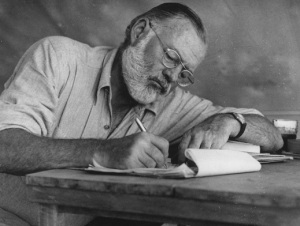
“Bret Lassiter,” by Marge Simon
I think writers are as necessary as doctors. Like a doctor, the writer performs the vital functions of diagnosing patients, advising them, and healing them.
Diagnosing: Through the generations, writers, like doctors, pretty much say the same things over and over, but in fresh, personal language. That’s because the human condition does not change. We must be told we are mortal, that we can and will get hurt, and that we should take better care of ourselves and loved ones.
Ernest Hemingway’s magnificent tale of war and loss in A Farewell To Arms remains one of the most powerful and vivid tales of the madness of World War I. Of course, its narrative is timeless because humanity is still being dazed and bloodied by conflict and loss. I still recall reading that book in high school, and how it shook me to the core the way it made the abstraction of death real. In the powerful final scene, the protagonist, Frederic Henry, makes the nurses leave the room where his wife has died in childbirth. He is determined to say goodbye. However, something is wrong:
But after I had got them out and shut the door and turned off the light it wasn’t any good. It was like saying good-bye to a statue. After a while I went out and left the hospital and walked back to the hotel in the rain.
Feel the lid of the coffin slamming down? The “statue” image chilled my marrow at age 17. An invaluable lesson.
Advising: Because death and suffering are real, the writer, like a good doctor, must caution readers about what they should and should not do. Sometimes we don’t listen, and need to be slapped in the face and reminded there are certain risks we’re taking without thinking about the possible consequences. Larry Niven’s “Bordered in Black” is one breathtaking example. I won’t give away the plot, but the story begins with Earth’s most famous astronaut destroying the first faster-than-light ship, from which he’s just explored the farthest reaches of space. Niven’s advice is this: Out there in the dark unknown, in alien places where the light from the nuclear fires we call stars cannot reach, there may have arisen Beings that are nothing like the cuddly ET. Nothing at all.
Something to think about before we broadcast more “Come on down!” messages from our radio telescopes.
Healing: And finally, no matter how well we take care of ourselves, pain and loss will find us. One story I enjoy re-reading is Yukio Mishima’s “Death in Midsummer,” which is about the accidental drowning of two children. The parents struggle to recover, and are finally able to return to the beach where their children died:
From beneath the clouds, the sea came toward them, far wider and more changeless than the land. The land never seems to take the sea, even its inlets. Particularly along a wide bow of coast, the sea sweeps in from everywhere.
The waves came up, broke, fell back. Their thunder was like the intense quiet of the summer sun, hardly a noise at all. Rather an earsplitting silence. A lyrical transformation of the waves, not waves, but rather ripples one might call the light derisive laughter of the waves at themselves – ripples came up to their feet and retreated again.
Those lines, I think, illustrate the surprising and timeless beauty that can emerge from harsh reality. By confronting our mortal condition, we appreciate more intently what it means to live. Finding that beauty is often difficult and fleeting, but it is possible, and literature helps us see it.
And those are the reasons I read. And write.







